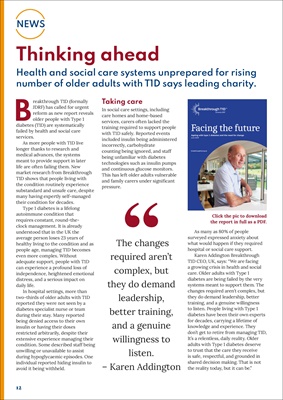
12
NEWS
The changes
required aren't
complex, but
they do demand
leadership,
better training,
and a genuine
willingness to
listen.
- Karen Addington
Thinking ahead
Health and social care systems unprepared for rising
number of older adults with T1D says leading charity.
Breakthrough T1D (formally
JDRF) has called for urgent
reform as new report reveals
older people with Type 1
diabetes (T1D) are systematically
failed by health and social care
services.
As more people with T1D live
longer thanks to research and
medical advances, the systems
meant to provide support in later
life are often failing them. New
market research from Breakthrough
T1D shows that people living with
the condition routinely experience
substandard and unsafe care, despite
many having expertly self-managed
their condition for decades.
Type 1 diabetes is a lifelong
autoimmune condition that
requires constant, round-theclock management.
It is already
understood that in the UK the
average person loses 23 years of
healthy living to the condition and as
people age, managing T1D becomes
even more complex. Without
adequate support, people with T1D
can experience a profound loss of
independence, heightened emotional
distress, and a serious impact on
daily life.
In hospital settings, more than
two-thirds of older adults with T1D
reported they were not seen by a
diabetes specialist nurse or team
during their stay. Many reported
being denied access to their own
insulin or having their doses
restricted arbitrarily, despite their
extensive experience managing their
condition. Some described staff being
unwilling or unavailable to assist
during hypoglycaemic episodes. One
individual reported hiding insulin to
avoid it being withheld.
Taking care
In social care settings, including
care homes and home-based
services, carers often lacked the
training required to support people
with T1D safely. Reported events
included insulin being administered
incorrectly, carbohydrate
counting being ignored, and staff
being unfamiliar with diabetes
technologies such as insulin pumps
and continuous glucose monitors.
This has left older adults vulnerable
and family carers under significant
pressure.
As many as 80% of people
surveyed expressed anxiety about
what would happen if they required
hospital or social care support.
Karen Addington Breakthrough
T1D CEO, UK, says: "We are facing
a growing crisis in health and social
care. Older adults with Type 1
diabetes are being failed by the very
systems meant to support them. The
changes required aren't complex, but
they do demand leadership, better
training, and a genuine willingness
to listen. People living with Type 1
diabetes have been their own experts
for decades, carrying a lifetime of
knowledge and experience. They
don't get to retire from managing T1D,
It's a relentless, daily reality. Older
adults with Type 1 diabetes deserve
to trust that the care they receive
is safe, respectful, and grounded in
shared decision making. That is not
the reality today, but it can be."
Click the pic to download
the report in full as a PDF.